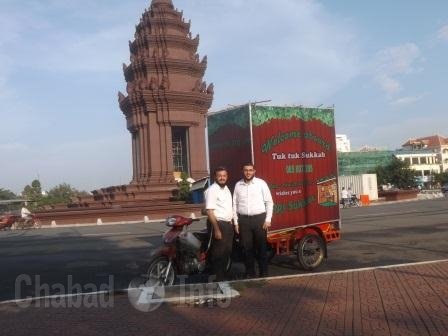
The Heart And Soul Of Cambodia
Twenty-nine-year-old Chabad Rabbi Bentzion Butman often stands in front of the two-story, balcony-laden Jewish Center located at No. 32, Street 28, in Phnom Penh, the capital of the ancient country of Cambodia, thousands of miles away from his hometown of Lod, Israel. At the front gate is a sign that says, “The Jewish Center” followed by the words, “No Jew will be left behind.”
Once called the “Pearl of Asia” and noted for its French colonial architecture, Phnom Penh may be a metropolis with only about 100 Jews out of a total population of about 1.5 million. Yet, the Jewish community was large enough to be cited by The Economist last summer as an example of Chabad’s reach to residents and travelers.
The rabbi says he and his wife Mashie settled here to help the Jewish community, even if there are only 100 Jews left.
“That’s what we mean when we say, ‘No Jew will be left behind,’” said Butman, who added that the Jewish community is composed of NGOs, embassy people and ex-pats. “I wouldn’t say it’s tough, it’s a challenge,” he said of his adjustment to this ancient land to which he came at the end of 2009.
Cambodia’s capital does not stand as the only Jewish presence in this country of 15 million. About 60 Jews reside in at least 20 towns throughout the country now booming with tourism, including Siem Reap, about 350 km. from Phnom Penh.
Siem Reap, a tourist boomtown, remains home to about 20 Jews, some of whom work in local hospitals. The town is bursting at the seams because Siem Reap is the gateway to Angkor Wat, the “mother of all temples,” and the heart and soul of Cambodia as well as the largest religious structure in the world. This 12th century Khmer temple stands adorned with elaborate bas-reliefs and its edifice contains the longest continuous relief ever carved. No wonder it’s considered the eighth wonder of the world.
An Israeli I once met described these Cambodian ruins as “mahshehu” (something). I agreed.
Once called the “Pearl of Asia” and noted for its French colonial architecture, Phnom Penh may be a metropolis with only about 100 Jews out of a total population of about 1.5 million. Yet, the Jewish community was large enough to be cited by The Economist last summer as an example of Chabad’s reach to residents and travelers.

The rabbi says he and his wife Mashie settled here to help the Jewish community, even if there are only 100 Jews left.
“That’s what we mean when we say, ‘No Jew will be left behind,’” said Butman, who added that the Jewish community is composed of NGOs, embassy people and ex-pats. “I wouldn’t say it’s tough, it’s a challenge,” he said of his adjustment to this ancient land to which he came at the end of 2009.
Cambodia’s capital does not stand as the only Jewish presence in this country of 15 million. About 60 Jews reside in at least 20 towns throughout the country now booming with tourism, including Siem Reap, about 350 km. from Phnom Penh.
Siem Reap, a tourist boomtown, remains home to about 20 Jews, some of whom work in local hospitals. The town is bursting at the seams because Siem Reap is the gateway to Angkor Wat, the “mother of all temples,” and the heart and soul of Cambodia as well as the largest religious structure in the world. This 12th century Khmer temple stands adorned with elaborate bas-reliefs and its edifice contains the longest continuous relief ever carved. No wonder it’s considered the eighth wonder of the world.
An Israeli I once met described these Cambodian ruins as “mahshehu” (something). I agreed.


6:08 PM in New Brunswick, NJ
Shabbat Ends 7:08 PM
Friday, 4 April 2025
Parashat